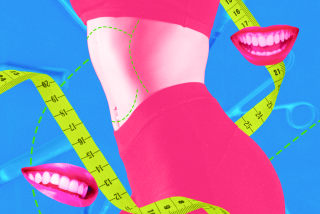Know thy enemy: sugar
One afternoon in 1978, when I was 24, I lay down in my apartment and decided to “face reality.” It’s a term I had just read in a Self magazine, and I decided to give it a shot.
Here was my reality: I weighed 275 pounds, ate everything in sight, watched TV all day and all night, smoked cigarettes and other things, drank alcohol to excess and had a loop of negative thoughts, feelings and memories working through my brain and body.
After the reality check, I decided I had two choices: end it all right there, or get up off the bed and figure out what was wrong with me.
Slowly, over the years -- through therapy, support groups, making amends, helping others and seeking spirituality -- I untangled the morass of negativity that had nearly destroyed me, and I have gone on to live a happy, sober and relatively thin life.
I am a rare species: a compulsive overeater who is not on medications, has not had gastric bypass or other surgery, and has not gained the weight back.
My secret? There is no secret. It’s hard work, a lifelong commitment to health.
But here’s something I figured out that I wish Oprah-of-the-ever-changing-weight would figure out: I cannot eat sugar and I cannot eat most carbohydrates.
Just as consuming even a tiny amount of alcohol sets an alcoholic up for a bender, consuming sugar and starches sets people like me up for a binge. An alcoholic will never be able to consume alcohol. It’s a physical sickness coupled with a mental obsession. Likewise, I will never be able to eat sugar. This is what many dieters I know can’t accept, and I watch with sorrow as they fall off the wagon again and again.
I liken me eating sugar to me getting in the boxing ring with Mike Tyson. I haven’t got a chance. There is good news, though. It starts with the understanding that for a sugar addict, when you eat sugar, you crave more. But when you abstain completely from sugar, the craving goes away within a few weeks, and it stays away -- unless you pick up again, and then the bone-crushing obsession is back in charge.
Here’s what I wish I could tell Oprah: Just because you reach a goal weight and look and feel gorgeous, that doesn’t mean you can start eating like a normal person. You are probably not a normal person. Your body probably does not react like a normal person’s to sugar and starches (and maybe not salt and fat either).
If people with 50 or 100 or more pounds to lose would understand the seriousness of their condition, I think it would be liberating, not depressing.
You can keep getting in the ring with Mike Tyson and you can keep getting knocked down. Or you can stop getting in the ring.
--
Kathy Price-Robinson is a freelance writer in New Orleans.
--


